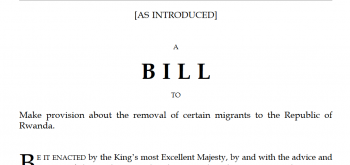Asylum seekers were being denied access to essential advice as a result of gaps in legal aid provision throughout the country, according to new research. A report from Refugee Action – No access to justice: how legal advice deserts fail refugees, migrants and our communities – identifies so called legal aid advice deserts outside of London including cities to which people seeking asylum are ‘dispersed’ such as Plymouth, Stoke and Hull. Swindon, a dispersal centre, has a provider with a legal aid contract but has not been able to recruit a caseworker at all.
‘This is the first piece of research that looks at access to immigration and asylum legal advice across the whole UK, and it shows there’s a deficit in every region of England, Wales and Northern Ireland, and a deficit across the country as a whole,’ comments the report’s author Dr Jo Wilding. ‘It means that people are missing out on refugee status or immigration status that they’re entitled to, and driving poverty and destitution in the UK as a result.’ According to Refugee Action, the ‘huge deficit’ leaves people with valid claims for asylum at high risk of forced deportation to Rwanda.
The report raises ‘huge concerns’ about Government plans for mandatory dispersal of asylum seekers and its locating of reception centres in Linton on Ouse in North Yorkshire as announced by the Home Secretary alongside her Rwanda deal in April. Unaccompanied asylum-seeking children are already being sent to local authorities in areas where there are no legal aid solicitors.
Local authority areas without legal aid cover include Cumbria, North Cheshire, Durham, Gloucestershire, Somerset, Surrey, West Sussex, Norfolk, Suffolk, Essex, and Lincolnshire.
‘It’s hugely concerning that accessing justice is so difficult at a time when the Government is tearing up its legal obligations to refugees,’ said Tim Naor Hilton, chief executive of Refugee Action. ‘People who do not get advice are put at a huge disadvantage when their claim for asylum is being assessed. Too many errors are already made on asylum decisions. With refugees being sent to remote accommodation centres, 5000 miles away to Rwanda, or home to face violence and persecution, it’s vital they can get legal advice.’
Legal aid deserts
The study measured deficit by comparing demand for legal aid against supply in all 10 regions or nations of the UK. Demand was calculated by adding up the number of people with an initial claim for asylum, the number of people who have asylum and are applying for settlement, the number of people referred to the National Referral Mechanism, and the number of people applying for indefinite leave to remain under domestic violence provisions. Supply was measured by the average number of legal aid cases started each year over the past three years. The calculations found that:
- The North West had 34 legal aid providers and a legal aid deficit of 6,470;
- The North East had 12 legal aid providers and a deficit of 3,365;
- Yorkshire and the Humber had 23 legal aid providers and a deficit of 4,329;
- The Midlands had 44 legal aid providers and a deficit of 3,903;
- Wales had 12 legal aid providers and a deficit of 2,266;
- The South West has 11 legal aid providers and a deficit of 1,165;
- The South East had 15 legal aid providers and a deficit of 988;
- The East of England had 12 legal aid providers and a deficit of 1,001.








